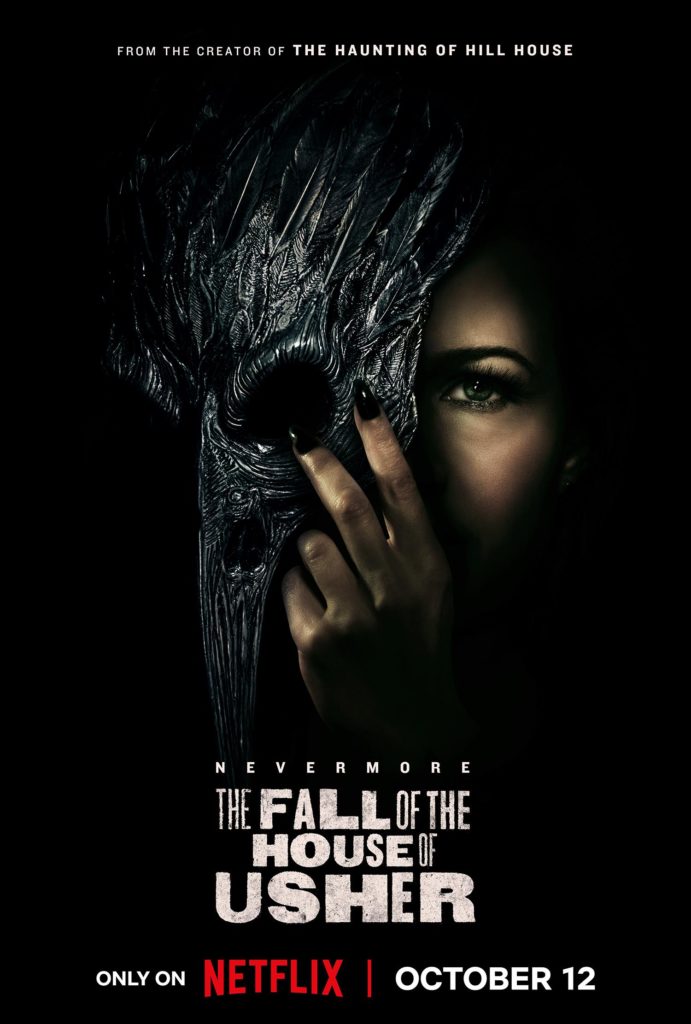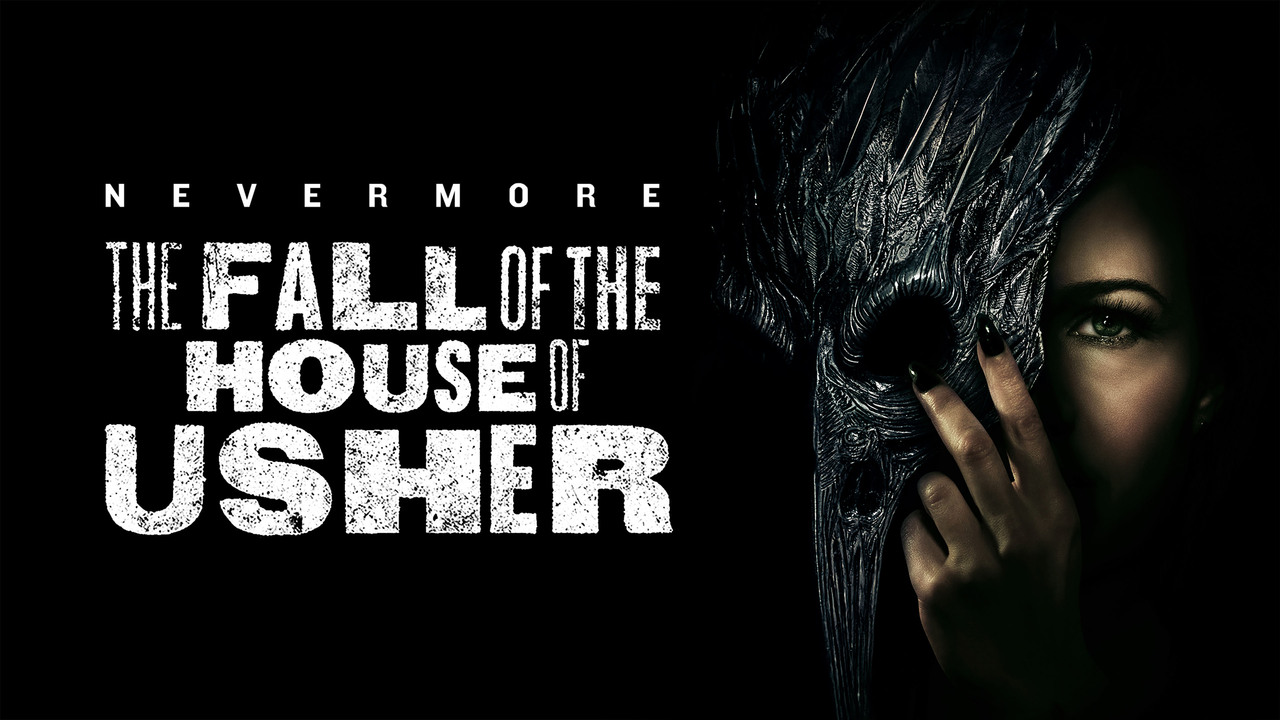By Schezelle J. Ward

The Fall of the House of Usher is a short story written by Edgar Allen Poe in 1839 that centers around the literal crumbling of the Usher family home. The cracks in the manor are a metaphor for main character, Roderick Usher’s, own guilt and fear, manifested as mental illness that is slowly killing him. Poe’s story is short with only three characters, but it is considered one of his most famous works of irony and symbolism. Horror director Mike Flanagan, though, lifts that short tale off the page and adapts it into an eight episodic bloody melodramatic nightmare of retribution and consequences upon an entire Usher bloodline.
The Fall of the House of Usher is the fourth horror miniseries Mike Flanagan and frequent collaborator, cinematographer Michael Fimognari, has created for Netflix. Their most acclaimed, The Haunting of Hill House, contains one of the most memorable episodes of any Netflix series, The Bent Neck Lady. More recently, Flanagan created Midnight Mass and The Midnight Club for Netflix and directed Doctor Sleep, the ambitious sequel to The Shining. Whether you loved it or hated it, you can’t deny that Flanagan rose to the challenge, recreating adult Danny Torrence’s Overlook horror and paying homage to Kubrick’s beloved classic. All that to say, Mike Flanagan is a force in horror thrillers, and using repeat actors in much of his work lends itself to a kind of trust and comfort between himself and his audiences. The Fall of the House of Usher benefits from that trust and the fact that a large part of the real world is already primed to watch a greedy, selfish family of elites get their comeuppance.
Usher follows the beginning of the end for a family of 7 heirs to the Usher fortune and their father, Roderick Usher (Bruce Greenwood, Star Trek) and aunt, Madeline Usher (Mary McDonnell, Battlestar Galactica), who share a major dark secret. Roderick and Madeline run the family enterprise, Fortunada and a wide range of subsidiaries. Decades before the story begins, Roderick and Madeline made a deal to guarantee their fortune and immunity from the consequences of whatever methods they devise to make that fortune – for a price. Eventually, we learn that the deal costs them the lives of their entire bloodline. It’s much more atrocious when we learn that the pair always knew their progeny would pay the price for the deal they made. From episode one it’s clear that the family has already begun to reap the consequences; we open on a funeral for three Usher heirs. Later in that episode we learn that this is the second funeral for three heirs that they’ve held within a week. For the next seven hours, Roderick narrates each heirs’ horrific and poetic death at the hands of some beautiful and illusive creature that is never conclusively identified as death, the devil or just some crossroads demon granting glory in exchange for the ultimate sacrifice.

Mike Flanagan spares no blood, no gore, and no scream, here. Flanagan’s usual brand of horror is mostly ghosts and supernatural effects and very rarely blood and guts. But, with Usher, he seems to delight in bringing these privileged brats their just desserts in the most macabre manner. With each episode, he lets us get to know each member of the Usher family just enough to ensure that we feel very little empathy when their time is up. The worst of the Usher heirs, Frederick, (Henry Thomas, The Haunting of Hill House, ET) tortures his bedridden wife for his own pleasure, while his half-sister, Victorine, (T’Nia Miller, The Haunting of Bly Manor) the ambitious scientist, kills her girlfriend and then herself when she can’t get her way. The least awful of bunch is a tie between the cat murderer, Leo, (Rahul Kohli, The Haunting of Bly Manor), and the leacherous youngest half-sibling, Perry, (Sauriyan Sapkota, The Midnight Club) who lured his sister-in-law to a debaucherous orgy to surreptitiously film her for leverage. Except for the baby of the family, sweet, caring and innocent granddaughter, Lenore, played by Kyliegh Curran (Doctor Sleep) there are no innocents here. But Lenore isn’t spared either. Death, albeit peacefully, comes for her all the same. Flanagan’s message is clear – when you deal with the devil, you and EVERYONE you love will reap what you’ve sewn.
Like everything Flanagan creates, the story doesn’t reveal everything at once. He gives us a little puzzle piece at a time until an entire picture develops of how Roderick and Madeline happened upon the the opportunity of a lifetime, and the huge secret that brought them to it in the first place. Each episode also flashes back to Roderick and Madeline’s past, showing how each choice they made sunk them deeper into the callous individuals that produced equally callous descendants. But the episodes aren’t all moral commentary. By the third episode, you realize there will be a bloody kill each hour. And even though you see it coming, Flanagan lays a foundation for each character so expertly, that when the kill happens, its not just frightening, it’s operatic. After watching the series, take a look at Netflix’s series posters, and you’ll get what I mean.

I couldn’t help but note the parallels between the Ushers and the Sackler family. The Sacklers recently came to international attention as the group responsible for the opioid epidemic and are the subject of another Netflix series, Painkiller. Both the Ushers and Sacklers rose to wealth and prominence because of a painkiller that causes an opioid crisis. Both families have been seemingly granted inoculation from accountability for, essentially, crimes against humanity. And although Painkiller was mostly docudrama, the depiction of the Sacklers made them appear as insufferable, privileged, tone deaf, greedy, and malicious as the fictitious Ushers. And I imagine that, like the Ushers, if the Sacker family ever get the justice they have coming to them, families around the world will have no problem watching their empire tumble down around them.
Watch The Fall of the House of Usher now on Netflix.







